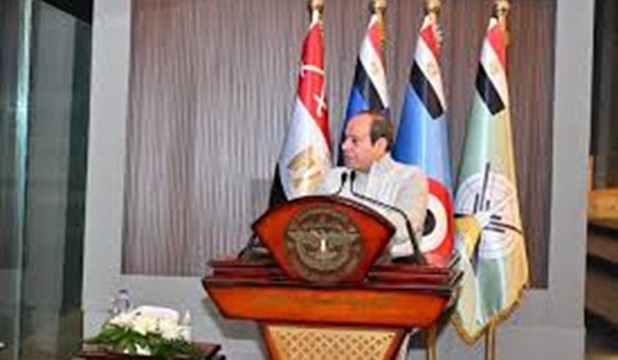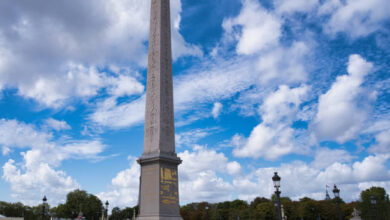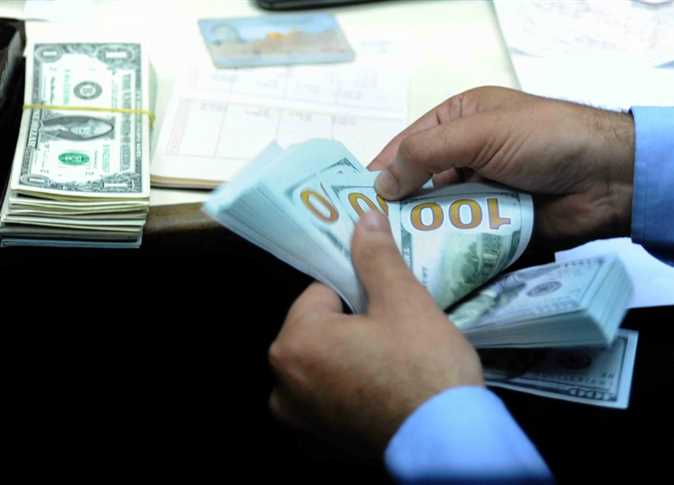
A large-scale program has been developed to help the Egyptian State progress in line with modern state standards, President Abdel Fattah al-Sisi announced Friday 10/1/2025.
“A country’s ability to ensure a proper level of services and living conditions for its citizens is determined by its resources,” President Sisi told students of the Egyptian Military Academy during an open dialogue.
He noted that despite the loss of billions of dollars in Suez Canal revenues, the International Monetary Fund (IMF) had applauded the ongoing economic reform process in Egypt.
“Many Egyptian companies are now thriving in various fields,” the president reassured citizens, confirming that the state is on the right track despite the challenges it has faced over the past four years.
Reviewing the challenges Egypt has faced over the past decade, President Sisi highlighted the significant power shift events that occurred from 2011 to 2013 and their profound impact on the country.
Sisi pointed out to the Central Bank of Egypt’s reserves depletion in 2011 and 2012, which affected the state’s economic capability to meet its needs during that period.
“Following 10 years of diligent work, a substantial program was laid down to help Egypt progress in line with modern state standards,” Sisi said, noting that the state’s efforts and plans in this regard have encompassed more than road development projects.
He stressed that a comprehensive plan is put into force to address multiple files, particularly the energy sector, especially in light of the power crises that occurred about seven to eight years ago.
Highlighting the state’s achievements in the energy sector, Sisi said the problem of power outages in summer over the past two years was not due to the state’s failure to produce enough electricity, rather it was attributed to “the exchange rate liberalization.”
“The state provides electricity to people at a ‘quarter’ of its actual price,” the president said. He also noted that gas cylinders are offered to citizens at “half” their actual price.
Sisi added that huge efforts had been made recently to build a stronger state, after a two-year hiatus in the development process.
He explained that over the past ten years, the state’s infrastructure has been improved and rehabilitated to press ahead with its development process as a developing, not an underdeveloped, nation.
As for the water sector, Sisi noted that Al Mahsama wastewater treatment plant (the largest in the eastern Suez Canal region) has the capacity to treat up to 1 million cubic meters of water a day, while Bahr el-Baqar treatment plant, the largest agricultural wastewater treatment plant in the world, has a daily treatment capacity of 5.7 million cubic meters.
He also pointed out to a plant which carries out tertiary filtration of wastewater at a daily capacity of 7.50 million cubic meters, emphasizing the importance of these and other water treatment plants for addressing the problem of “water poverty” in Egypt, where annual per capita water consumption amounts to 500 cubic meters.
The state’s development program also includes ambitious agricultural projects, the president pointed out, noting that the state has managed to increase the area of cultivated lands by 4.5 million feddans during the past four years, using modern irrigation and agricultural systems.
According to him, water is being carried from the water drains in Alexandria’s Al-Max neighborhood and other areas in the coastal governorate for advanced tertiary treatment, to be finally used for cultivating 4.5 million feddans.
Sisi said the Egyptian population has increased by about 27 million since 2011, wondering if the state’s resources have increased in parallel with such a remarkable population growth.
The President stressed that hard work is needed to ensure a “decent life” for all.
He also emphasized the need to cut public spending in light of the country’s limited resources.
Sisi also shed light on some urban development achievements, such as the New Alamein City and the establishment of 24 new cities, including the New Administrative Capital.
He said these projects had created many jobs for citizens nationwide, which helped in reducing the unemployment rate that ranges between 6.7 and 6.9 percent.
As for the industrial sector, Sisi said the government has for almost a year been working with investors and the private sector to transfer certain industries into Egypt, which will contribute to boosting the country’s dollar resources.
He noted that once these resources are available, the economic situation will be much better and the cost of living will go down.
Sisi also touched on other achievements in the education, healthcare, agriculture, manufacturing, as well as maritime and air transport sectors.
He underlined the importance of getting a complete picture about the current position of the state, its resources, and the prerequisites for its advancement and viability.
Warning about the grave danger of creating a rift between Egyptians, Sisi said those who want to bring any country down always try to instigate conflicts among its people and pit them against each other.
Egypt has paved the way for investors by enhancing electricity, roads, ports, and water infrastructure, along with legislative frameworks and a robust banking system, all critical components for attracting investments, Sisi said.
Speaking about the transport sector, Sisi revealed that the government has invested EGP 2 trillion to establish a comprehensive transport network, including railways, metro systems, and Bus Rapid Transit (BRT) services. This network aims to connect Ain Sokhna to Cairo, the New Administrative Capital, Alexandria, Alamein, and Salloum, as well as extend from Cairo to Aswan, adding 2,700 kilometers to the national road network.
Sisi highlighted the efforts to alleviate pressure on Cairo, warning that had the situation remained as it was in 2011-2012, the city would have turned into a “parking lot.”
The President also noted that the electricity sector required an equal investment of EGP 2 trillion to address critical challenges with a scientific plan, sacrifice, and determination. He stressed that the outcomes of these efforts will become evident in the future.
Additionally, Sisi pointed out that Egypt lost $7 billion in direct revenues from the Suez Canal over the past 11 months due to the global impact of the war. However, the International Monetary Fund has affirmed Egypt’s steady progress on its economic reform program. The lost revenues, equivalent to EGP 350 billion, were expected to be allocated to various development sectors, but the country remains committed to its reform path.
Sisi said that Egypt’s annual wheat consumption has reached 20 million tons, with the state producing half domestically and importing the other half.
Reflecting on Egypt’s agricultural land, Sisi explained that 50 years ago, the country had around 6-7 million feddans of arable land and a population of 30 million. “This equated to one-third of a feddan per person. Now, with 10 million feddans and a population of 100 million, this ratio has dropped to one-tenth of a feddan per person.”
Sisi highlighted that during the era of Mohamed Ali, Egypt’s economic conditions were more favorable due to a better land-to-population ratio. Back then, 4-5 million feddans served a population of 4 million, providing one feddan per person, which ensured self-sufficiency in wheat, corn, and cotton, as well as other essentials.
He noted that rural households in the past operated as small productive units, reinforcing Egypt’s self-sufficiency without needing foreign currency for imports. “Now, the reliance on imported goods increases the demand for dollars, putting pressure on the economy.”
The President emphasized that producing wheat domestically saves foreign currency and creates job opportunities, while importing requires securing dollar reserves at global market prices.
He urged the public to understand these dynamics to avoid misconceptions about the state’s efforts and responsibilities.
Sisi outlined Egypt’s strategic vision to strengthen its soft power in African countries, emphasizing the state’s achievements over the past decade.
Sisi highlighted the growth of Egyptian companies working in diverse fields such as energy, infrastructure, ports, tunnels, transportation, and railways. “These projects are implemented by Egyptian firms with strong expertise, earning them trust and a solid reputation both domestically and abroad.”
He noted that Egyptian companies are now active in Libya, Saudi Arabia, Iraq, and other nations, with many receiving requests to execute projects through competitive bids. “Once contracts are awarded, the companies begin work immediately.”
However, Sisi acknowledged that instability in neighboring countries has negatively impacted the development trajectory of Egyptian companies abroad, as development relies heavily on stability, trade opportunities, and joint projects.
Currently, around 5,000 Egyptian companies specialize in various fields and are ready to work internationally, fostering positive relations with requesting countries, the President added.
Sisi also emphasized the role of universities in supporting Egypt’s soft power, highlighting efforts to double the number of universities over the past decade, improve their global rankings, and establish partnerships with international institutions. “This includes creating universities tailored for both Egypt and other countries, enhancing Egypt’s educational presence globally.”
Sisi outlined Egypt’s ongoing efforts to address the 16-month-long Gaza conflict, stressing that Cairo operates under four principles: ending the war, releasing hostages, facilitating humanitarian aid, and preventing the recurrence of similar crises.
He highlighted the recurring cycle of violence in Gaza, stating that similar conflicts erupt every 5 to 10 years, and emphasized Egypt’s commitment to breaking this pattern.
Sisi noted that Egypt, in collaboration with international partners, has succeeded at times in halting the fighting and ensuring aid delivery, with a significant portion of the assistance coming from Egypt.
On Syria, Sisi reaffirmed Egypt’s policy of preserving Syria’s unity and sovereignty.
He mentioned that the Egyptian Red Crescent has delivered 10 tons of humanitarian aid, underscoring Egypt’s role as a positive actor.
He also stressed the importance of inclusive governance in Syria, allowing all factions and ethnic groups to participate.
Regarding Syrians in Egypt, Sisi revealed that the country hosts 1.5 million Syrians among its 9 million foreign residents, offering them support to the best of its ability.
Concluding his visit to the Egyptian Military Academy, Sisi urged students from the “121 War College” class and equivalent military colleges to dedicate themselves to their training and education, equipping them to shoulder the responsibility of protecting the nation.




